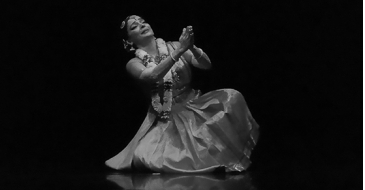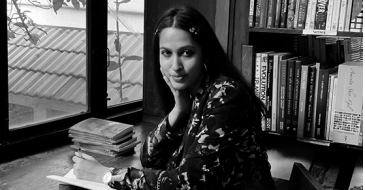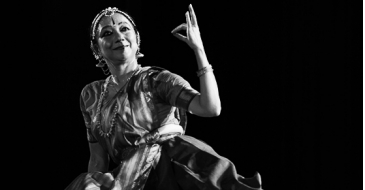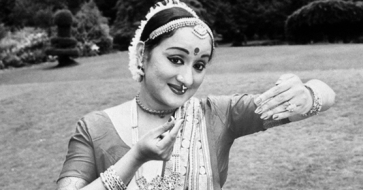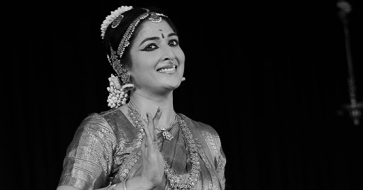What is the first thing that comes to your mind when someone says passion?
I think it’s the colour. The colour red. It’s a blurry image of that colour that comes to my mind when someone says passion… Maybe because I love red. It’s representative of a desire - of sorts - to get out of bed, and in a sense, get on with the day. The break of dawn, the heart, the blood, all these imageries are associated with this colour. Don’t you see the connection?
Would you think of passion as something abstract?
I’d say, somewhere in between the realm of abstract and real. You see, passion cannot be given a concrete image as such, right? It is almost like a womb of imagination, that feeds you, drives you, propels you and inspires you to become a better version of yourself. Let’s just say that in my scheme of things, passion has no form but has a sense of quality. And it is very much real for the individual who follows it.
In Guruvayoor, the name Krishna would echo more than once in a day in all the households irrespective of any religion. Being a student of dance, it was natural for me to be even more attracted to this name and the character. So in a way dance was my sakhi who tempted me to be with Him, only to find out later that He himself is my dance
How and when did you recognize that dance was your passion?
I don’t remember a particular incident or moment, honestly. If I look back, it seems to me there were many occasions/situations that helped me recognise and realise how much I love dance; how much in love I was with dance. Truth is, my passion for dance is more than what even I can see…
Let me tell you a story. I was in class 7 or 8 - I don’t remember exactly - and I was on my way to Chidambaram with my my parents, dance teacher and musicians; we were all crammed into a Fiat Palio - I remember that so vividly - and I remember I was on top of the world, full of excitement and enthusiasm even though I was almost in the boot of the car. In Chidambaram, I was allowed to dance in front of the deity, but then I did not realise how incredibly privileged I was. It was just like another presentation for me. But as I began to dance, I couldn’t stop crying. Tears kept streaming down my eyes and I had no clue what was going on; There was nothing about the piece that even demanded me to cry; but I cried… When I returned to my home in Guruvayoor, after the trip something in me had changed; including the way I looked at dance.

What was the tangible change that happened after? Was that change something within you or something everyone recognized, or something shifted, overall, in your dance?
I don’t think anyone recognized anything; the change was all within. It was the way I looked at my own dance. My Amma ensured I lead a fairly disciplined life. I’d wake up at 4 in the morning, practice dance, do yoga, etc. There was already a routine that was set for me. And my teacher was saying, I was good at what I was doing; so, in a sense, I continued doing what I was.
But you see, I grew up in Guruvayoor. So, for me, life, love, emotions, everything was really about Krishna. There is this constant dialogue going on in my mind with Him, even while I speak to you. He isn’t a god for me; it's more like how I speak to myself. He is my relationship with anything and everything in this world. The relationship - if you know what I mean - is Krishna; It wasn’t this way back then; but as time went by, dance, at large, became synonymous with Krishna.
Dance is personal for me; it’s an intimate experience. It is about relationships, about investing in it, about spending quality time with it; it’s an entity in itself; it’s my comfort and my companion. When this shift occurred within, I began enjoying my dance more than ever.
You say everything about you is Krishna. Does passion ever feature in that relationship?
You see, in the beginning, when you asked me, my instant response to passion, I said that the colour red comes to my mind, right? But you see, Krishna is really full of colours. There is some red too. Krishna is something that drives me. Dance is also like that; it occupies almost the same place that Krishna does in my heart. I can’t put it down in words; let’s just say it’s a feeling.

Do you have to go back to Guruvayoor each time to feel that feeling or is that feeling within and travels wherever you go/are?
Truth be told, I rarely ever go to the temple. Even when we lived there, going to the temple wasn’t an act of religion or a ritual. The temple is where I continue to feel recharged; it is a place I go to when I’m feeling low; its atmosphere, its energy elevates my spirit. The temple is like a refuge, a retreat for me. So, you see, Guruvayoor isn’t about the place or a deity; Krishna is with me wherever I go; wherever I am.
Did you grow up in a household where Krishna existed but not in the way we often tend to think of rituals and religious aspects of things?
Absolutely! In Guruvayoor, the name Krishna would echo more than once in a day in all the households irrespective of any religion. Being a student of dance, it was natural for me to be even more attracted to this name and the character. So in a way dance was my sakhi who tempted me to be with Him, only to find out later that He himself is my dance.
Talking about my own family, there was and always is an inclination towards spirituality. It was more about the way we lived, rather than the rituals or the religion we follow. What I remember is that my parents were both disciplined in their own ways. My Amma was very strict and my Acha (father in Malayalam) would often tell me that if you commit to do something, you’ve got to see it through. Else, don’t even commit. I’d like to say that I am happy that I listened to him and remained committed to dance.
I can’t claim to be spiritual because honestly there are so many things I need to work on before I get there. What I experience is more like a private spirituality at this stage. But I am aware of the bigger picture and the journey is on.
Life is like a mirror for an artiste. Those are the experiences that you bring through your dance. Unless you look at it with all the passion - to learn, to know, to experience - it is difficult to translate those experiences into your dance
Would you think that because of this Krishna within, a concept you hold on to strongly, you have learnt to respond to fame, accolades, recognition, with humility. You seem like a person for whom validation doesn’t seem to matter.
Perhaps; but I must confess that I wasn’t always like this. When I was young, and people appreciated me, it felt fantastic. Having said that, there were also times, when it hurt when people didn’t appreciate you.
As time went by, I began to understand and appreciate the idea that it is not merely about what I receive from people but also what I put into whatever I do. My parents have always been there for me and have consciously reinforced the fact that everything we do is not all about recognition.
Let’s say, you have a goal and you get there; what then? You see this is crucial because after all, dance isn’t something like that for me; it isn’t a goal; it isn’t a deadline I’m chasing; it is about rigour; it is about the process…
In Kerala, we have this tradition of competitions where if you win, you are conferred with awards that help you with your academics. Parents are obsessed with this and as a result, children are forced to participate and everything is really so competitive, so aggressive. I was also into it at one point. I studied in a school that followed a CBSE curriculum. My teacher told me I had to take part in a competition, and I moved schools.
Fortunately, for me, my Amma and all my teachers reiterated for me that these competitions were not about outcome but about learning and the experience.
Yet, I found myself feeling very frustrated and disillusioned by it all. And that is really how I moved to Chennai, seeking another teacher in dance. Finally, it seemed like I’d left the world of competition behind and was in a safe space.

Do you feel like you continue to reinforce - to yourself - the importance of process over performance?
Always. As an artiste, you may have many performances in a year, or sometimes, if luck isn’t in your favour, you may not even have one. You really can’t rely on performances to learn or to educate yourself.
The process is more important because through the process I have learned much more than I have from a performance. Having said that, I must add that you do learn from performances but the bulk of the learning happens only in the process.
Learning also is not just about learning about dance. Every time learning happens in a particular way; sometimes it hits me hard and I emerge as a new person; a person for whom something has altered, hopefully for the better.

Can you talk about one project that shifted your perspective on things or changed something for you?
Let’s look at a production I worked on for the Erasing Borders festival for the Indian American Arts Council. They were celebrating the 75th year of Indian independence, that is last year and everything was revolving around the idea of independence and freedom.
So, I started thinking about many things. Basically, it coincided with a phase in my life where everything was very cluttered. It felt like there was a traffic jam in my head, if you know what I mean. It was also during the second wave of the pandemic and even though everything around was quiet and silent, the mind was full of noise.
I was getting ready to have a baby. I was by myself and even though I was filled with a ton of ideas, it seemed like I didn’t even have one. Overall, it was very frustrating.
Usually, when I work on a project, I like to read, leave, return, read again and whenever an idea occurs to me, I accept it. But this time I was literally struggling. And then, one day, I began reading Tagore and his famous poem, Where the mind is without fear…. That poem got me thinking about the importance of clearing/cleansing the mind as citizens and humans. I thought about the importance of the notion of responsibility as an individual; that unless we are thinking unconditionally, we will never be able to break the walls within our minds. As a result, this idea planted itself in my head and I began working with it. I decided to dig further and even talked to a psychologist about how the mind works. I met a whole host of people and finally realised that what I was having was a monologue with myself. That realisation hit me hard and I recognised I had to be aware of the feelings within and learn not to be affected by it. This understanding has helped me a great deal and now I tend to think of this as my process. I can't say I am a pro at it, but it has helped me because I can feel the difference. You won't know what thought or what is influencing you unless you are conscious of it.
Why is it important to have silence and stillness to be able to create work? As a new mother, is it possible to carve out compartments of silence? How have you done that? Is the idea of stillness and silence also part of the idea of passion? Because you are passionate about it you have to kind of bring silence and stillness into your work. How do you do it?
Speaking specifically about this work, I began from a point where everything around me was silent but inside me there was chaos. However, after this work, I have understood that there can be silence within even if everything around me is in a state of chaos. This is the change that has happened for me and that helps me a lot right now because honestly nothing around me is silent; think of life with a one-year-old. Almost always, Thumri, my daughter is around me while I am thinking or dancing.
But I have learnt that this is a shift that needs to come from within; you need to understand and come to terms with the fact that you don’t always have to be in a silent space to have a silent mind. Even in a really crowded place, you can have a silent mind. Once you realise that, I think there’s no going back. You don’t need to then think of a space to sit quietly to think because in a sense, you are thinking throughout the day. Your thoughts are not all over the place. That is the clarity I found from this process.
Silence in your mind is crucial. And it doesn’t necessarily need to bring forth new things. Sometimes the chaos also gives birth to new ideas. Plus, I don’t think we need to be obsessed with the idea of silence; as if to say that only if we have silence can we do new things. I am not even sure whether we have really understood the concept of silence. It is not just the absence of sound. Silence is like the spaces between words; without them, words don't mean anything. It would be just jumbled letters. When we write, when we speak or even when we breathe, there are moments of silence, to which we do not pay attention at all. Silence is everywhere, you just need to be aware of it.

What about silence in the context of dance? How do you create those spaces of silence with dance? Because your dance is like that, there is intensity and silence. How do you create that in dance?
You know in stand-up comedy, the comedian knows exactly when to pause for a laugh, for an applause. Though not in a literal sense, the same thing happens in choreography. If you give that space for the audience to breathe, that is silence. It shouldn’t be too overwhelming or also absolutely nothing. It needs to have a sense of balance; it needs to allow the audience to cherish the moment and return, in a jiffy!
As a dancer, as an artiste is it crucial for you to imbue that passion into everything that you do or is passion not piece-specific? What is the difference between performing poetry that is laden with passion vs infusing everything you do with a sense of passion? Is there a demarcation at all?
As an artiste, what I believe is unless you are passionate about living, it is impossible to imbue those experiences in your art in a way that is beautiful and meaningful for the audience. Life is like a mirror for an artiste. Those are the experiences that you bring through your dance. Unless you look at it with all the passion - to learn, to know, to experience - it is difficult to translate those experiences into your dance.
I am not sure about deliberately infusing passion into everything you do, but I suppose it is something that is seen, that is experienced. Sometimes people tend to judge the artiste in the art; they say a passionate dancer/artiste because they see it in her/his work.
Dance is my ikigai. Everything I do, is actually pointing towards dance. When I wake up, the first thing I think about invariably is dance. I finish cooking soon so that I have time for my dance. I get my baby ready so I have time for my dance. My whole life is centred around the idea of dance
How would you think of pace and intensity in the context of passion?
Passion is not a goal. It is a process in itself. It is something that gets you out of your bed. Dance is my ikigai. Everything I do, is actually pointing towards dance. When I wake up, the first thing I think about invariably is dance. I finish cooking soon so that I have time for my dance. I get my baby ready so I have time for my dance. My whole life is centred around the idea of dance.
I have to spend time on it, in it, with it. That is what is passion for me. The urge, the desire, is what is passion for me. Intensity matters but not the pace. That fire has to be burning, constantly. I feel guilty when I don’t dance, that feeling of guilt is my passion.
Are there moments when you go to practice and don’t feel that passion?
Passion is a constant pursuit. If it is a relationship, you do have some days when there are ups and downs. It happens all the time but you end up coming back to it, and making it work for you.
What is the support one needs to pursue this passion, especially in the context of dance?
No relationship exists on its own. It has to have many layers of foundation for it to stand tall, erect. It is dance that made me start reading, learning music, mridangam, Kalari, yoga.
I want to sustain as a dancer for a long time. It is a very selfish thing, but it is the truth. Everything in a sense co-exists. All I want to say is that I am incredibly privileged and I believe that in my previous lives, I would have suffered a lot to be given so many things in abundance. The only thing is I have to be responsible about what I have been given.

Why is singularity in pursuit crucial in the context of passion?
In a relationship, the more time you spend with a person, the more you understand about them. If you spend less time, that person becomes distant and you tend to lose the connection. I think that connection is important to maintain all through the relationship without ever losing it. That connection has to be very real and consistent. Otherwise, it may go out of your hand and getting it back is really difficult.
Interviewed by Akhila Krishnamurthy
0 comments Comments
SIGN UP TO RECEIVE OUR WEEKLY NEWSLETTER IN YOUR INBOX





